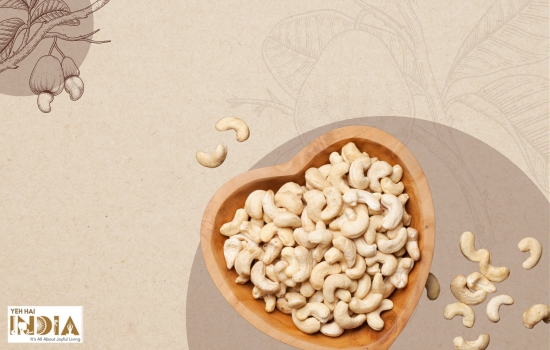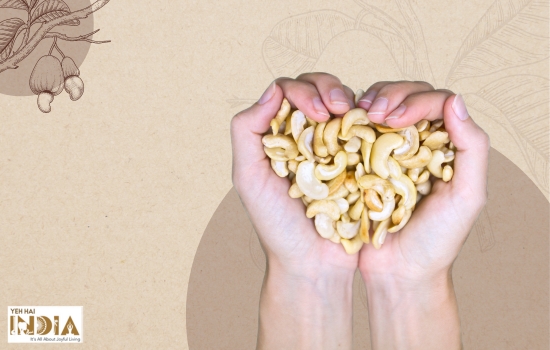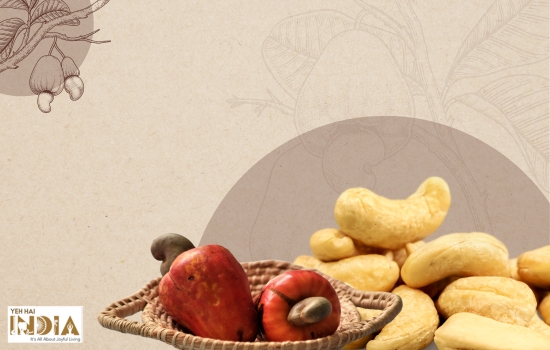Cashews are fascinating seeds that come from the cashew tree, scientifically known as Anacardium occidentale L., and belong to the unique Anacardiaceae family. They are versatile and scrumptious treats that have gained popularity in Indian cuisine and dairy alternatives.
Cashews – Royalty of Nuts & Seeds
Cashew seeds are shaped like kidneys and have an abundance of nutrients and the potential to provide numerous health advantages. To fully harness their beneficial effects on health, it is crucial to carefully select suitable varieties and properly cook or prepare them.
Originating from the cashew tree native to Brazil but now grown in various warm climates worldwide, cashews are not technically tree nuts but seeds. They made their way to India and Africa thanks to the intrepid Portuguese explorers during the 16th century.
Kaju grows as single-seeded wonders, snuggled within a tough grey shell, nestled at the bottom of a cashew apple (a fruit). And guess what?
There are not just a handful, but a whopping 33 different varieties of cashew nuts out there! However, only 26 of these varieties make it to the market, and one particular variety, the illustrious W-180, reigns as the undisputed “King of Cashews.”
What are Raw Cashews?

While “raw” cashews are commonly available, truly raw cashews are unsafe for consumption due to the presence of a toxic substance called urushiol, also found in poison ivy. Contact with urushiol can lead to skin reactions in certain individuals.
To remove this harmful compound, the raw cashews undergo a careful cooking process. The cashew kernels are steamed or roasted to neutralize the urushiol, making them safe to eat.
This processing also enhances the flavour and texture of the seeds, transforming them into the familiar and delicious nuts we commonly enjoy.
After the cooking process, the resulting product is known as “raw” cashews, even though they are no longer truly raw in the botanical sense.
These processed seeds can be used in various culinary applications and are packed with nutrients, making them a popular and healthy snack option.
Loaded with essential nutrients and beneficial plant compounds, these delicious seeds are a versatile addition to numerous dishes despite their botanical classification.
Their potential health benefits include aiding in weight loss, promoting improved blood sugar control, and supporting heart health, among other advantages.
Recommended Article: Raisins: A Tiny Superfood with Big Health Benefits
This comprehensive article examines the nutritional profile, potential benefits, and possible drawbacks of cashew nuts, offering valuable insights into their overall impact on well-being.
Nutritional Value of Kaju
Per 100g serving
Calories: 553 kcal
Carbohydrates: 30 g
Protein: 18 g
Fats: 44 g
Fibre: 3.3 g
Sugars: 5.9 g
Sodium: 12 mg
Iron: 6.68 mg
Calcium: 37 mg
Key Benefits Associated with Kaju
Heart-Healthy Fats:
Despite their high-fat content, cashew nuts or kaju contain heart-healthy monounsaturated fats. These fats can help lower bad cholesterol levels (LDL) and raise good cholesterol levels (HDL), reducing the risk of cardiovascular diseases. Including kaju in a balanced diet can contribute to a healthier heart.
Rich in Essential Nutrients:
Cashew nuts are a rich source of nutritious compounds. They provide a wide range of essential nutrients, including vitamins like vitamin E, vitamin K, and B vitamins, as well as minerals such as magnesium, zinc, and phosphorus.
Antioxidant Properties:
Cashew nuts are packed with antioxidants that help protect the body against harmful free radicals. This process helps reduce inflammation and enhances the body’s ability to stay disease-free.
These antioxidants, including compounds like vitamin E and selenium, neutralize oxidative stress and reduce the risk of chronic diseases, such as cancer and heart disease. Kajus are particularly rich in polyphenols and carotenoids, two types of antioxidants also found in other tree nuts.
Numerous studies have associated antioxidants in nuts like walnuts, pecans, and almonds with a decrease in oxidative cell damage. Given their similar antioxidant profile, it is reasonable to assume that Kaju may offer similar benefits in fighting oxidation.
Roasted cashew nuts, in particular, appear to have higher antioxidant activity compared to their “raw” counterparts.
However, it is essential to note that research on cashews specifically is limited, and further studies are required to draw firm conclusions.
Promotes Weight Management:
Contrary to popular belief, including moderate amounts of cashews in a balanced diet can support weight management. Cashews provide a good combination of protein, fibre, and healthy fats, which can help increase satiety and prevent overeating.
Additionally, the monounsaturated fats in cashews have been linked to a lower risk of weight gain over time.
Recommended Article: Pista: Nature’s Gift for a Healthy Heart and Mind
Dangers Associated with Over-Consumption of Kaju

Allergies:
Cashew allergies are relatively common and can manifest as mild symptoms like itching and hives or more severe reactions like difficulty breathing and anaphylaxis.
It’s crucial to be aware of any allergies and seek medical advice if you experience adverse reactions after consuming cashews.
High Caloric Density:
Cashews are energy-dense due to their high-fat content. While the fats in cashews are generally healthy, consuming them in excessive amounts can contribute to weight gain.
It’s essential to practice portion control and incorporate cashews into a well-balanced diet to avoid exceeding daily calorie requirements.
Potential Oxalate Content:
Cashews, like many other nuts and seeds, contain oxalates. In individuals prone to kidney stones or with existing kidney issues, high oxalate intake can increase the risk of stone formation.
If you have a history of kidney stones or kidney-related concerns, it’s advisable to consult with a healthcare professional regarding your cashew consumption.
Roasting Concerns:
Roasting cashews is a popular way to enhance their flavour and texture. However, the high temperatures used during roasting can lead to the formation of acrylamide, a potentially harmful compound.
Acrylamide has been linked to certain health risks, including cancer. Opting for raw or dry-roasted cashews can be a safer choice to minimize acrylamide exposure.
Remember, moderation is key when it comes to enjoying Kaju. While they offer numerous health benefits, it’s essential to be mindful of portion sizes and consider individual health conditions or allergies.
Incorporating cashews into a balanced diet can be a delightful and nutritious addition to support your overall well-being.
Recommended Article: Badam Milk, A Warm Hug in a Cup: Recipes & Health Benefits
In conclusion, Kaju, or cashew nuts, are a versatile and nutritious addition to any diet. Their health benefits, such as supporting heart health, aiding in weight management, and providing essential nutrients, make them a valuable choice.
However, it is crucial to enjoy them in moderation and be mindful of portion sizes. So, embrace the delightful crunch and flavour of kaju while reaping the benefits of this remarkable nut in a balanced and mindful manner.
Frequently Asked Questions
Are cashews a good source of protein?
Yes, cashews are a good plant-based source of protein, making them beneficial for vegetarians and vegans.
Can cashews be included in a weight loss diet?
Despite their calorie content, cashews can be included in a weight loss diet due to their high protein and fibre content, which promote satiety.
Can cashews be dangerous if consumed in excess?
Consuming cashews in excessive amounts can lead to weight gain and nutrient imbalances. It’s important to practice moderation.
Are cashews suitable for individuals with diabetes?
Yes, cashews can be part of a balanced diet for individuals with diabetes as they help regulate blood sugar levels due to their fibre and healthy fat content. However, portion control is crucial.
Also, Read: Rich and Delicious Kaju Recipes for the Soul!










